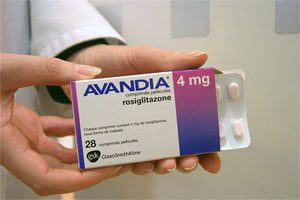
In response to lawsuits brought by eight U.S. states, drug maker, GlaxoSmithKline, has agreed to pay hundreds of millions of dollars to settle actions over diabetes medication, Avandia (rosiglitazone). The drug maker announced it would pay $229 million and, in a regulatory filing, stated that the settlement was within the provisions it had set aside […]
 In response to lawsuits brought by eight U.S. states, drug maker, GlaxoSmithKline, has agreed to pay hundreds of millions of dollars to settle actions over diabetes medication, Avandia (rosiglitazone).
In response to lawsuits brought by eight U.S. states, drug maker, GlaxoSmithKline, has agreed to pay hundreds of millions of dollars to settle actions over diabetes medication, Avandia (rosiglitazone).
The drug maker announced it would pay $229 million and, in a regulatory filing, stated that the settlement was within the provisions it had set aside for litigation previously, according to Reuters. The settlement agreement also covers allegations brought by the Louisiana attorney general associated with other Glaxo products.
The eight states did not accept a prior settlement that had been agreed to by 37 other states in 2012 over Avandia and involved cardiac issues, Reuters reported. Last year, in one of the largest health care fraud cases in the nation’s history, Glaxo agreed to pay $3 billion and plead guilty to criminal charges. That matter involved off-label marketing, including of Paxil to pediatric patients as well as charges that Glaxo neglected to provide federal regulators with safety data on Avandia, Reuters explained.
Avandia was pulled from the European market in 2010; Avandia’s use has been heavily restricted in the U.S.
The current settlement does not involve admission of liability by Glaxo and, said Glaxo spokeswoman Mary Ann Rhyne, is meant to avoid long trials. The eight states are Louisiana, Kentucky, Mississippi, Maryland, South Carolina, New Mexico, West Virginia, and Utah.
Avandia belongs to a class of diabetes drugs called thiazolidinediones that lower blood sugar by decreasing insulin resistance. Since November 2007, Avandia’s U.S. label has included a black box warning detailing its association with heart attacks. The black box was added after Dr. Steven Nissen of the Cleveland Clinic published a study showing that patients taking Avandia had a 40 percent increase in the risk of cardiovascular disease.
Since 2007, more evidence of Avandia’s heart risks has accumulated and thousands of lawsuits have been brought against GlaxoSmithKline over the blockbuster drug. In 2010, the FDA placed severe restrictions on sales of Avandia after determining its heart risks outweighed its benefits.
Dr. Nissen has long said that Avandia is too dangerous for use in diabetes treatment and is among a group of experts that says that the U.S. Food and Drug Administration’s (FDA) revisiting of this drug is not about protecting patients, but about saving face, according to a prior The New York Times report. “The efforts to whitewash this entire affair is really an unacceptable misuse of their regulatory role,” Dr. Nissen told The Times. “The evidence against this drug is overwhelming,” he said previously.
Only 3,000 people in the U.S. take Avandia today, a significant decrease from the 120,000 prior to the restrictions.
According to Reuters, Glaxo is also the focus of a major probe being conducted by Chinese authorities over accusations of broad bribery meant to sell Glaxo medications in China.


